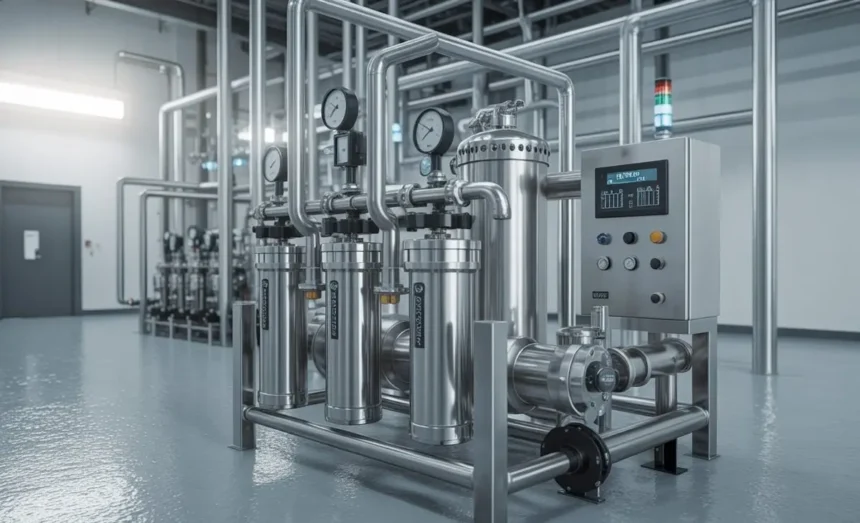Clean water is essential across industries, from manufacturing and food processing to healthcare and agriculture. Water quality directly affects safety, efficiency, and compliance with regulations. Contamination can lead to serious consequences, including compromised products and legal issues. Ensuring water quality compliance isn’t just a regulatory requirement—it’s vital for sustainable and reliable operations.
Operational Downtime and Equipment Damage
Contaminated water can significantly damage equipment through wear, corrosion, and scaling. Over time, this causes premature breakdowns, increases maintenance needs, and leads to unexpected downtime. Whether it’s mineral buildup in machinery or chemical corrosion in piping systems, poor water quality undermines your infrastructure and disrupts workflows. For operations relying on continuous processing, any halt due to water-related equipment failure translates to lost revenue and productivity. Regular testing and strict adherence to water quality compliance standards can prevent these disruptions, ensuring water systems are clean, efficient, and fully operational. Prioritizing preventative care for water systems reduces emergency repairs and maintains smoother production cycles.
Health Hazards to Workers and End Users
In sectors like food production, healthcare, and hospitality, contaminated water creates direct health risks. Pathogens, heavy metals, or chemical residues in water can cause serious health issues. If employees interact with unsafe water or if it compromises workplace hygiene, worker safety is jeopardized, and liability concerns arise. More critically, if your operations create products for public consumption, contaminated water can enter the supply chain. This endangers consumers and erodes brand trust. Upholding water quality compliance protects your workforce and public health through strict control measures. Prioritizing the well-being of everyone involved in your operations builds long-term trust and minimizes health-related legal exposure.
Regulatory Consequences and Fines
Water quality regulations protect both the environment and public health. Failing to meet these standards can lead to severe legal repercussions, including fines, shutdown orders, or lawsuits. Regulatory bodies take violations seriously, making non-compliance a costly issue for businesses. Consistent compliance demonstrates responsibility and transparency. Routine monitoring, accurate documentation, and proactive remediation strategies are not only best practices; they also minimize the risk of penalties. Proactively addressing potential issues helps avoid investigations and ensures uninterrupted operations.
Negative Impact on Product Quality
Water is often an overlooked ingredient in many products. Whether it’s used for rinsing, cooling, diluting, or mixing, its purity directly impacts the final product. In industries like beverages, pharmaceuticals, and cosmetics, contaminated water can alter a product’s taste, appearance, or effectiveness. Even trace amounts of impurities can lead to defects or costly recalls. Poor water quality can harm your company’s reputation and increase product returns. Adhering to water quality standards ensures your products meet performance requirements and customer expectations, which builds brand loyalty.
Environmental Harm and Sustainability Goals
Contaminated water in industrial processes doesn’t just affect internal operations—it also pollutes ecosystems. Discharging untreated water into public systems or natural environments harms wildlife and disrupts local water sources. Companies committed to sustainability must recognize the connection between water management and environmental impact. Adhering to water quality compliance protects natural resources and supports your company’s sustainability goals. Demonstrating responsible water use enhances your reputation and aligns your brand with environmental accountability.
Proactive Steps Toward Safer Water
Understanding the risks of contaminated water is just the first step. To safeguard your operations, implement systems that prevent, detect, and correct water quality problems. This involves routine testing, employee training, equipment maintenance, and consulting professionals for compliance assessments. Investing in internal audits and third-party evaluations supports long-term planning and reduces unexpected issues. With strict protocols and a culture of accountability, organizations can confidently manage both operational needs and environmental responsibilities. A proactive approach strengthens your business foundation and ensures compliance with minimal disruption.
Conclusion
Contaminated water is more than a technical problem—it threatens productivity, safety, and your business’s reputation. Its effects spread across all operations, from equipment damage to legal risks. Prioritizing water quality compliance protects your infrastructure, products, people, and the planet. Establishing responsible practices today reduces costly future problems and positions your organization for sustainable growth.







